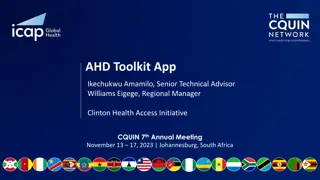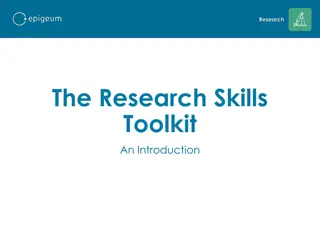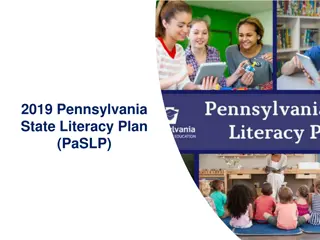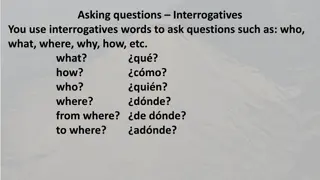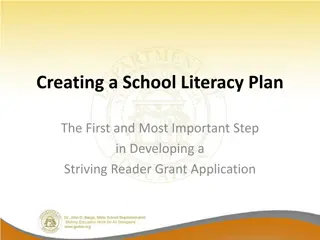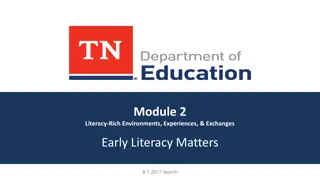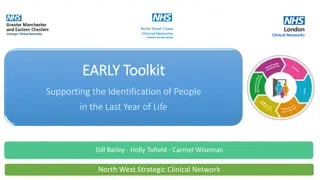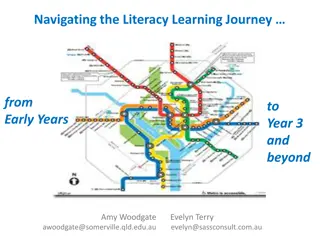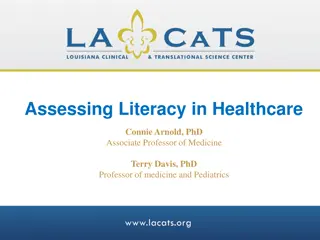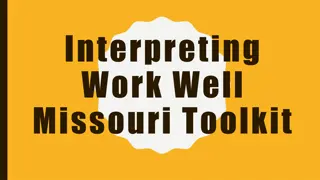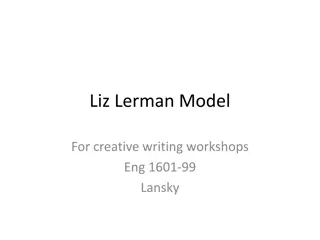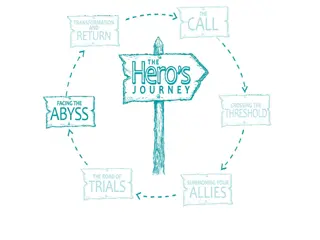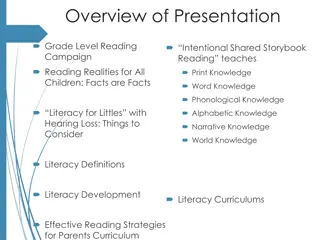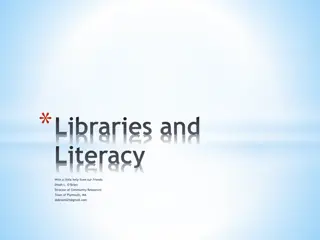Asking the Right Questions at the Right Time for School-Aged Children Literacy Toolkit
This literacy toolkit focuses on the importance of asking effective questions to support children's language development and reading skills. It includes activities such as discussing the frequency of questions in classrooms, exploring language skills for reading, and using the Blank Language Scheme to enhance verbal reasoning. The toolkit aims to improve educators' questioning practices and enhance personalized support for students in literacy.
Download Presentation

Please find below an Image/Link to download the presentation.
The content on the website is provided AS IS for your information and personal use only. It may not be sold, licensed, or shared on other websites without obtaining consent from the author.If you encounter any issues during the download, it is possible that the publisher has removed the file from their server.
You are allowed to download the files provided on this website for personal or commercial use, subject to the condition that they are used lawfully. All files are the property of their respective owners.
The content on the website is provided AS IS for your information and personal use only. It may not be sold, licensed, or shared on other websites without obtaining consent from the author.
E N D
Presentation Transcript
Asking the Right Questions at the Right Time for School Aged Children Literacy Toolkit HGIOS4 Where does it link to How Good is Our School? 2.2 Curriculum 2.3 Learning, teaching and assessment 2.4 Personalised support
Asking the Right Questions at the Right Time for School Aged Children Literacy Toolkit Agenda Activity 1 Introduction / Starter Activity (5 mins) Activity 2 How s it going / feedback (10-20 mins) Activity 3 New Learning (60-70 mins) Activity 4 Personal Action Planning (10 mins)
Asking the Right Questions at the Right Time for School Aged Children Literacy Toolkit Activity 1: Introduction activity Discuss: Teachers ask an average of one question every minute (Glasson, 2005). ~ Do you think this is too many, too few or just right? Why? ~ What are the advantages and disadvantages of asking questions in the classroom? Glasson, S. (2005). Hooked on questioning: How the teacher librarian can change questioning practices in their schools. Following the task, discuss: What did you learn?
Asking the Right Questions at the Right Time Activity 2: How s it going? what we already know Literacy Toolkit One in five poorer children in Scotland leave primary school unable to read well ( four times higher than for children from the least disadvantaged backgrounds). Early language skills listening, understanding words, speaking, and building vocabulary are the vital foundation that enable children to learn to read. Currently, children from the most deprived areas are twice as likely to experience difficulties in language development by the time they start school. Ready To Read, Closing the gap in early language skills so that every child in Scotland can read well Discuss: What areas of language development are important when children are learning to read and write?
Asking the Right Questions at the Right Time for School Aged Children Literacy Toolkit Activity 3: New Learning Mrs Smith, why do we have to wait for the green man? Discuss: What language skills/knowledge do you need to successfully answer this question?
Asking the Right Questions at the Right Time for School Aged Children Literacy Toolkit The Blank Language Scheme Devised by Blank, Rose and Berlin (1978) Encourages development of children s verbal reasoning and abstract language Grades language and questions according to complexity 4 different levels that are based on the developmental nature of verbal reasoning
Asking the Right Questions at the Right Time Literacy Toolkit Matching Perception - the whole object Level I Name an object - what is this? Point to an object - show me the... Point to an exact match - find one like this name something in the immediate past - what did you see on the table?
Asking the Right Questions at the Right Time Literacy Toolkit Selective analysis of perception - part of the object Level II finding objects by function - which do we eat with? sentence completion - I put my hat on my .... naming things that match - what goes with the spade? sorting and categorising - what else is a fruit? linguistic concepts - find a blue ball, find a small hat describe a scene - what is happening in the picture? name a difference - what is different about a dog and a horse? describe things - who? what? where?
Asking the Right Questions at the Right Time Literacy Toolkit Re-ordering perception - object in its context Level III follows a set of directions - put the dog in the box, put the lid on and give it to me gives an example with a condition - show me a animal that is not black identifies similarities - how are these the same? can arrange pictures in a sequence tells a story / describes an event - what did you do today in games? show theory of mind - what might Mum say? what might Mum feel? give a definition - what is a mouse? summarise the story in a sentence - what have you done? predict - what might happen next?
Asking the Right Questions at the Right Time complex and abstract verbal problems - the relationships between objects, people, events and reasons Literacy Toolkit Level IV justify a problem - why will the boat float? identify the cause - what made the boy cry? solve a problem - what could you do if you didn't have your lunch? solve a problem from another person's perspective - what could Mrs Smith do if she didn't have any paper? Make an inference from an observation - how can we tell that this book is old? explain why something cannot be done - why can't penguins fly? select a means to a goal - what do we need to make Mother s Day card? explain the logic of compound words - why is this called a newspaper?
Asking the Right Questions at the Right Time Literacy Toolkit Now it s your turn to try!
Asking the Right Questions at the Right Time Literacy Toolkit Using Blank levels to support behaviour What happened? Who does the teddy belong to? How is Joshua feeling? Why is he feeling x? What should you say to Joshua now? How can you do things differently next time? If you wanted to borrow Joshua s teddy, what could you have said? What would you have done / how would you have felt if somebody grabbed your teddy? So, what do you need to do now?
Asking the Right Questions at the Right Time Literacy Toolkit Activity 4: Personal Action Planning Select one curriculum or topic area to focus on over the next month e.g. literacy, numeracy, in the playground, circle time etc. Think about how you will adjust your questioning to the right level how will you know what level is right ? Share your action plan with a partner. Bring back your findings to the next session
Asking the Right Questions at the Right Time Literacy Toolkit FOLLOW UP LINKS: Ready to Read Scotland Read on Get on - Scotland RALLI Campaign - YouTube Building Vocabulary for Better Literacy - Highland Literacy The Communication Trust Highland Literacy - Emerging Literacy



